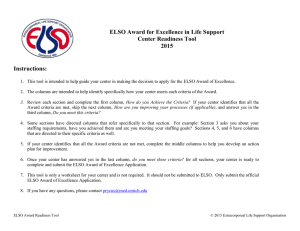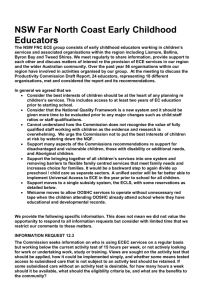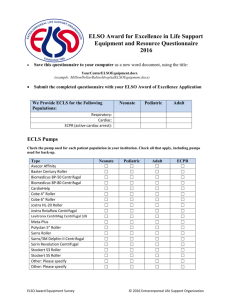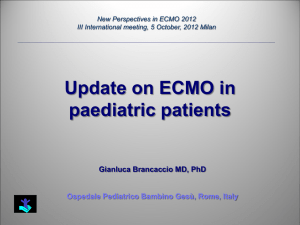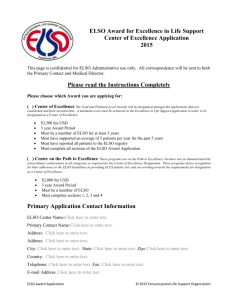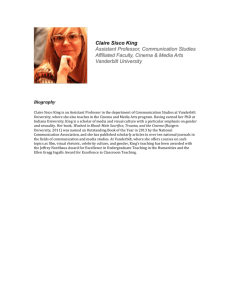Center Application Number: _30_____ (To be filled in by ELSO)
advertisement
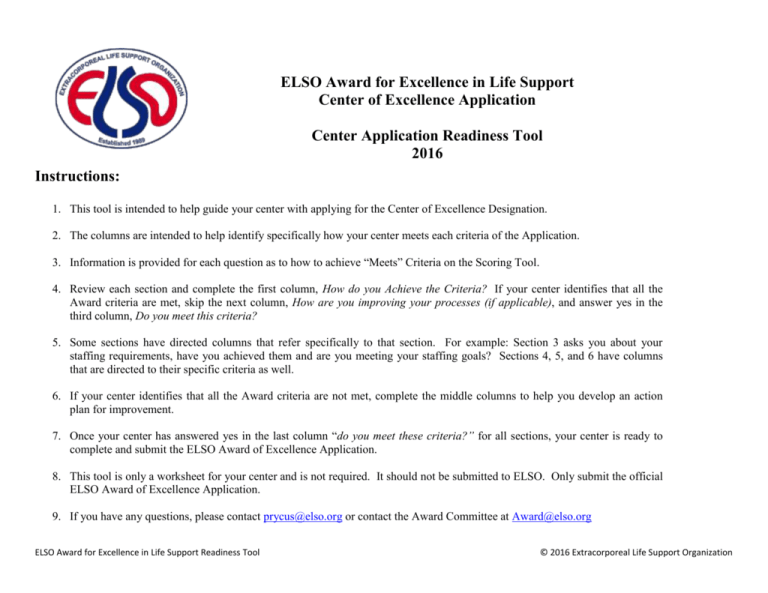
ELSO Award for Excellence in Life Support Center of Excellence Application Center Application Readiness Tool 2016 Instructions: 1. This tool is intended to help guide your center with applying for the Center of Excellence Designation. 2. The columns are intended to help identify specifically how your center meets each criteria of the Application. 3. Information is provided for each question as to how to achieve “Meets” Criteria on the Scoring Tool. 4. Review each section and complete the first column, How do you Achieve the Criteria? If your center identifies that all the Award criteria are met, skip the next column, How are you improving your processes (if applicable), and answer yes in the third column, Do you meet this criteria? 5. Some sections have directed columns that refer specifically to that section. For example: Section 3 asks you about your staffing requirements, have you achieved them and are you meeting your staffing goals? Sections 4, 5, and 6 have columns that are directed to their specific criteria as well. 6. If your center identifies that all the Award criteria are not met, complete the middle columns to help you develop an action plan for improvement. 7. Once your center has answered yes in the last column “do you meet these criteria?” for all sections, your center is ready to complete and submit the ELSO Award of Excellence Application. 8. This tool is only a worksheet for your center and is not required. It should not be submitted to ELSO. Only submit the official ELSO Award of Excellence Application. 9. If you have any questions, please contact prycus@elso.org or contact the Award Committee at Award@elso.org ELSO Award for Excellence in Life Support Readiness Tool © 2016 Extracorporeal Life Support Organization I. Systems Focus Provide generalized background information about your institution. Scoring Information: This Section is scored as either “does not meet” or “meets”. Your Center will receive points if you follow the Extracorporeal Life Support Guidelines and have answered these questions completely. 1.3 and 1.4 1.2 1.1 Criteria How do you Achieve the Criteria? How are you Improving your Processes? (if applicable) Do you Meet Criteria? Has your center been a member of the Extracorporeal Life Support Organization (ELSO) for at least 3 years? How many patients have been supported with ECLS at your center per year in the last 5 years? Assure that every patient is submitted and that your registry data is up to date prior to submitting your application. Are there other patients in your center that are placed on a form of ECLS Therapy that are not reported to ELSO? Why not? Will you submit your data on retrospective patients? Review the ELSO Guidelines for ECMO Centers. Does your institution have specialty services available for all possible patient needs? Why not? If not, be prepared to explain what your center will do in the event of a need. Can this be approached within your institution as a need? ELSO Award for Excellence in Life Support Readiness Tool © 2016 Extracorporeal Life Support Organization 1.7 1.6 1.5 Criteria How do you Achieve the Criteria? How are you Improving your Processes? (if applicable) Do you Meet Criteria? Does your center have access to inter hospital transport services? Why not? Can this be developed? Be prepared to describe your plan for transport needs should they arise. How do you transport ECMO patients within your own facility? Does your ECMO Center have a designated Medical Director? What is their scope of responsibility? Review the ELSO Guidelines to develop your position. This MD should have overall responsibility for protocols, policies, education of the team, including physicians, patient selection criteria. The director should act as a champion and leader for the ECMO program to upper administration. Does your ECMO Center have a designated position (a coordinator) who is responsible for the implementation of training and education of ECMO Staff, Unit staff, policies, procedures, quality initiatives, data collection, supplies, etc. If not, who fulfills this role? Can you improve this positions’ job description? ELSO Award for Excellence in Life Support Readiness Tool © 2016 Extracorporeal Life Support Organization 2. Environmental Focus Provide information about your facility and equipment available for ECLS. Scoring Information: Question 2.1 is marked as either “does not meet” or “meets”. Your Center will receive points if you follow the Extracorporeal Life Support Guidelines and have answered these questions completely. Questions 2.2 and 2.3 require that you have robust systems in place to meet your patient’s needs and are scored as either “does not meet”, “meets”, or “exceeds”. As you provide in-depth details regarding your plans, including unique aspects, your Center may achieve additional points. 2.3 2.2 2.1 Criteria How do you Achieve the Criteria? How are you Improving your Processes? (if applicable) Do you Meet Criteria? Is ECLS performed in a designated unit or units? Are there areas that are not considered ECLS capable? Does that unit have patients that require transfer to an acceptable area? Do you designate a system backup in the event of emergencies? Is this system ever used for patient care? Are there instances where this replacement equipment is not available? How do you ensure the safety of all ECLS patients in the event of equipment failure if there is no backup system available? Do you have a maximum pump capacity? What do you do in the event of an emergent request if all pumps are utilized? Do you have an emergency increased census plan? Should you? What crisis will initiate it? How do you plan for increased staffing needs? ELSO Award for Excellence in Life Support Readiness Tool © 2016 Extracorporeal Life Support Organization 3. Workforce Focus Provide information about the staffing for your institution. Scoring Information: This Section is scored as either “does not meet”, “meets”, or “exceeds”. Questions should be answered as completely as possible, with attention to detail. Leaving out small facts may impact your ability to achieve a higher score for that question. Remember, all applications are de-identified and anonymous - the Award Review Committee only has the information that you provide in your application to calculate your score. As you provide in-depth details regarding your program, including unique aspects, your Center may achieve additional points leading to an “exceeds”. Question 3.2 is not scored, and is only used for data collection and baseline information. 3.2 3.1 Criteria What are your Staffing Requirements/Aims? How do you Achieve Them? Are you Meeting your Do you Goals? Meet (Describe barriers, Criteria? opportunities, successes if applicable) How has your center determined the best disciplines to staff ECLS pumps? What education and background is necessary to become a trained ECLS “specialist” in your center? Has this changed? Has this been reviewed recently? What skill set does this person have to have in place in order to approach the new skills of ECLS? Do you require a unique feature of personnel prior to becoming an ECLS Specialist? How has your center determined the staffing requirements for ECLS patients? Do you have different requirements for staffing different populations? How do you account for seasonal variances? If a pre-determined plan is in place, how do you evaluate and adjust to changing staffing needs? ELSO Award for Excellence in Life Support Readiness Tool © 2016 Extracorporeal Life Support Organization 3.5 3.4 3.3 Criteria What are your Staffing Requirements/Aims? How do you Achieve Them? Are you Meeting your Goals? (Describe barriers, opportunities, successes if applicable) Do you Meet Criteria? Do you have 24-hour medical management of the ECLS patient? Does this vary unit by unit or by patient population? Should it? Are alternative medical practitioners used (NP, PA, etc.)? Who has the ultimate decision in patient management issues? Has this practice been reviewed recently? How do you ensure that expertise in pump management techniques is available to ECMO Specialists throughout the ECLS run? Who fulfills this roll? Are these resources divided into skills and are there multiple positions that fill these roles? Has this been reviewed recently and is this the most effective use of personnel in your center? What other resources do you have available for bedside staff to use? Are they multi-purpose, multifunction, multi-platform? Who fulfills the role of circuitry priming in your institution? Is this provided by an on-call or in-house role? Is this effective in providing for the needs of the patients? Have there been occurrences where this role has not been satisfactory? Has this been reviewed and have there been changes implemented? ELSO Award for Excellence in Life Support Readiness Tool © 2016 Extracorporeal Life Support Organization 3.7 3.6 Criteria What are your Staffing Requirements/Aims? How do you Achieve Them? Are you Meeting your Goals? (Describe barriers, opportunities, successes if applicable) Do you Meet Criteria? Is there a formal or informal process in place for ECLS staff after critical stressful incidents? Is it generic for all staff? In which areas? Hospital provided? Unit specific? Can you develop or improve debriefing and support for your specific staff members? Can you describe an example that will illustrate how this process occurs in your institution? How do you identify and manage patient/family issues that create ethical and moral distress for/in staff? Is it a hospital wide process? How do you assure that ECLS issues are supported? Can you describe an example that will illustrate how this process occurs in your institution? ELSO Award for Excellence in Life Support Readiness Tool © 2016 Extracorporeal Life Support Organization 4. Knowledge Management Provide ECLS Team training and competencies. Scoring Information: This Section is scored as either “does not meet”, “meets”, or “exceeds”. Section 4 is directly related to the ELSO Guidelines for Training and Education. Questions should be answered as completely as possible, with attention to detail. Leaving out small facts may impact your ability to achieve a higher score for that question. Remember, all applications are de-identified and anonymous - the Award Review Committee only has the information that you provide in your application to calculate your score. As you provide in-depth details regarding your program, including unique aspects, your Center may achieve additional points leading to an “exceeds”. Centers who are being considered for the Award of Excellence should go above and beyond the guidelines by considering physician and advanced practitioner education. Inclusion of specific ECLS education for primers is also an important component of knowledge management. Completion of a basic educational degree is not considered specific for ECLS. Criteria What are your Educational Requirements/Aims? How do you Achieve Them? Are you Meeting your Goals? (Describe barriers, 4.2 4.1 opportunities, successes if applicable) Do you Meet these Criteria? Does your center require baseline training or education for physicians that provide medical/surgical management of the ECLS patient, specific to ECLS? What is the training? List everything MDs attend – such as meetings, patient care minimums, prior experience, etc. Is this effective? Does it meet the needs of the patient? Of the ECLS Staff? Has this been reviewed recently? Does your institution grant privileges or credentialing for ECLS? Should it? Does your center require annual continuing education for physicians who provide ECLS care? What type of education is required? List everything MDs attend – such as meetings, inservices, patient care minimums, prior experience, etc. Is this effective? Is this satisfactory for your patients? For your staff? Has this been reviewed recently and have changes been implemented? ELSO Award for Excellence in Life Support Readiness Tool © 2016 Extracorporeal Life Support Organization 4.4 4.3 Criteria What are your Educational Requirements/Aims? How do you Achieve Them? Are you Meeting your Goals? (Describe barriers, opportunities, successes if applicable) Do you Meet these Criteria? Does your center require annual continuing education for physician extenders or providers who deliver ECLS care? What type of education is required? List all. Is this satisfactory for your patients? For your staff? Has this been reviewed recently and have changes been implemented? How has your center determined the best plan for the initial training and education of bedside ECLS specialists? Review the ELSO Guidelines. How is your plan based on ELSO guidelines? How are learning and development needs identified and translated into your plan? Have you incorporated new techniques recently? How do you ensure that all staff members are oriented and competent to provide safe care to patients? How are orientation plans tailored for individual needs? Do you incorporate evaluated feedback into future training plans? How do you assess a new ECLS Specialists’ competency? Is the written test comprehensive? Is an oral or performance based test required? What is the passing score? Is there a review process to assess the effectiveness of such a competency evaluation? If your team is perfusion based, how do you assess competency for the specific skill set of ECLS? ELSO Award for Excellence in Life Support Readiness Tool © 2016 Extracorporeal Life Support Organization 4.5 How has your center determined the best plan for the continuing education of bedside ECLS specialists? Review the ELSO guidelines. Is this based on ELSO guidelines? How are learning and development needs identified and translated into your plan? Have you incorporated new techniques recently? How do you ensure that all staff members are competent to provide safe care to patients? How do your ECLS meetings meet your educational goals? How have you incorporated water drills or simulations into the continuing education? Do you have a mechanism to evaluate annual education needs and do you incorporate feedback into future education plans? Do you maintain records for review by governing bodies? What are the attendance requirements? Can you detail the journey of a specific ECLS Specialist from initial education through their annual education requirements for several years? 4.6 Criteria Do you have a method to evaluate staff and determine if they do not meet annual education requirements? What specifics do you require? Do you have a mechanism to re-train these staff? Is this mechanism safe and conducive to quality patient care? Does it promote staff satisfaction? ELSO Award for Excellence in Life Support Readiness Tool What are your Educational Requirements/Aims? How do you Achieve Them? Are you Meeting your Goals? (Describe barriers, opportunities, successes if applicable) Do you Meet these Criteria? © 2016 Extracorporeal Life Support Organization 4.9 4.8 4.7 Criteria What are your Educational Requirements/Aims? How do you Achieve Them? Are you Meeting your Goals? (Describe barriers, opportunities, successes if applicable) Do you Meet these Criteria? How has your center determined the best plan for the continuing education of bedside caregivers? What is this based on? How are learning and development needs identified and translated into your plan? Have you incorporated new techniques recently? How do you ensure that all staff members are competent to provide safe care to all patients? How do you ensure that staff that prime are oriented and competent to provide consistent practice to all patients? How do you incorporate new staff with previous prime experience into your current practice? Can you list specifics that must be completed, such as drills, meetings, # of primes, etc. If your program is perfusion based, how do you assure that all perfusionists are performing to standards? How do you assure that they are competent specifically for ECMO? How has your center determined the best plan for the continuing education of primers? What is this based on? How are learning and development needs identified and translated into your plan? Can you list specifics that must be completed, such as drills, meetings, # of primes, etc. Have you incorporated new techniques recently? If your program is perfusion based, how do you assure that all perfusionists are performing to standards? How do you assure that they are competent specifically for ECMO? ELSO Award for Excellence in Life Support Readiness Tool © 2016 Extracorporeal Life Support Organization 5. Quality Focus Provide continuous quality improvement activities. Scoring Information: This Section is scored as either “does not meet”, “meets”, or “exceeds”. Section 5 is directly related to the ELSO Guidelines for New ECLS Centers. Questions should be answered as completely as possible, with attention to detail. Leaving out small facts may impact your ability to achieve a higher score for that question. Remember, all applications are de-identified and anonymous - the Award Review Committee only has the information that you provide in your application to calculate your score. As you provide in-depth details regarding your program, including unique aspects, your Center may achieve additional points leading to an “exceeds”. Statistics and data, where applicable, should be provided. Examples should be all inclusive. An example does not need to be brief. Embed any charts or graphs that may add significance to the example. This may add points and lead to an “exceeds” score. 5.1 Criteria How/What/Why do you Measure? Analysis: Did you Create Improvement? Future Plans Do you Meet these Criteria? How does your center ensure that policies, procedures, protocols and guidelines used are based on internationally recognized current evidence, standards, and best practices? How do you develop new policies and procedures? How are they reviewed? How often? How do you communicate this knowledge within your team? Meetings? Emails? Other? What specific ECMO related quality projects related to policies, procedures, protocols and guidelines did you implement in the last 2 years? Can you describe this from assessment through planning, initiation, implementation and evaluation? How did your changes affect patient care? How did you know it was an improvement? ELSO Award for Excellence in Life Support Readiness Tool © 2016 Extracorporeal Life Support Organization 5.2 Criteria How/What/Why do you Measure? Analysis: Did you Create Improvement? Future Plans Do you Meet these Criteria? Best Practice is defined as a technique or methodology that, through experience and research, has proven to reliably lead to a desired result. A commitment to using all the knowledge and technology at one’s disposal to ensure success. This may be a practice that you have initiated or one that you have adopted from another source. Google “Best Practice in Healthcare” for more information. What new best practice related to workforce management (staffing), initial education and training, OR continuing education was implemented in your ECLS center in the last 2 years? Did you measure the improvement? How have you increased staff satisfaction or retention? How does your program foster a culture of improvement? Who was the primary driver behind this initiative? If clinical staff is not involved in the initiative, how can you develop your program to include them? ELSO Award for Excellence in Life Support Readiness Tool © 2016 Extracorporeal Life Support Organization 5.4 5.3 Criteria How/What/Why do you Measure? Analysis: Did you Create Improvement? Future Plans Do you Meet these Criteria? Value of Care is a term that encompasses improving performance and accountability with health care cost containment, patient satisfaction, and high quality. Google “Value of Care” for more information. What improvement initiative in your ECLS program has been implemented to improve the value of the care you deliver to the patient or family? Have you implemented cost savings measures that have improved patient outcomes or satisfaction? Do you measure patient or family satisfaction? What do your patients/families value? What have you done in the last two years to improve your patients/families experience while in your ECLS center? Have you implemented cost saving measures that have positively impacted both your program and your patients? Have you reduced waste, such as duplicate labs, or improved efficiency? How has this created value for your patients? ECLS related conferences should be a priority for ELSO Centers. Have your team members attended conferences with regularity? Who attends? Can this be expanded? Where could untapped funds come from to allow more staff to attend? Is your center active within ELSO? Is there a committee that your center could have representation on? ELSO Award for Excellence in Life Support Readiness Tool © 2016 Extracorporeal Life Support Organization 6. Process Optimization Provide outcome reviews and developmentally focused care. Scoring Information: This Section is scored as either “does not meet”, “meets”, or “exceeds”. Section 6 is directly related to the ELSO Guidelines for New ECLS Centers. Questions should be answered as completely as possible, with attention to detail. Leaving out small facts may impact your ability to achieve a higher score for that question. Remember, all applications are de-identified and anonymous - the Award Review Committee only has the information that you provide in your application to calculate your score. As you provide in-depth details regarding your program, including unique aspects, your Center may achieve additional points leading to an “exceeds”. Statistics and data, where applicable, should be provided. Examples should be all inclusive. An example does not need to be brief. Embed any charts or graphs that may add significance to the example. This may add points and lead to an “exceeds” score. Question 6.4 is a “does not meet” or “meets” scored question. Failure to provide your anticoagulation protocols and/or structure will result in loss of points. 6.1 Criteria Processes/ Outcomes Affected How/What/ Why do you Measure? Analysis: Did you Create Improvement? Do you Meet these Criteria? Morbidity and Mortality Review for all major complications or deaths should be conducted in all ECLS centers. Detail your process completely. How do you incorporate other disciplines into the review process? Within how many days, weeks, months of the incident do you hold your review? Can you describe a recent example (within 2 years) with discussion, analysis and conclusions? ELSO Award for Excellence in Life Support Readiness Tool © 2016 Extracorporeal Life Support Organization 6.2 Discuss how you review and compare your center specific patient data, including outcomes, ECLS run results, and complications. How often do you incorporate and utilize the data from the bi-annual ELSO Data Registry Reports at your center? How has the registry impacted patient care within the last two years at your institution? Describe this impact from initial identification through the change implemented and the results of that change. Do you have a unique use of the Registry data? 6.3 Criteria Benchmarking in healthcare is a continuous process where an organization can measure and compare its own internal processes with those of other organizations that are leaders in a particular field. An organization cannot benchmark against its own measures. Google “Benchmarking” for more information. How do you benchmark? Who do you benchmark against? Who is responsible for assessing this? How has benchmarking influenced your ECLS practice? Can you give a recent (within 2 years) example of how your benchmarking influenced process change? Is it related to Financial OR Product OR Process OR Strategic OR Functional OR Operational Benchmarking? Your example should specifically reflect ECLS ELSO Award for Excellence in Life Support Readiness Tool Processes/ Outcomes Affected How/What/ Why do you Measure? Analysis: Did you Create Improvement? Do you Meet these Criteria? © 2016 Extracorporeal Life Support Organization 6.4 Criteria Processes/ Outcomes Affected How/What/ Why do you Measure? Analysis: Did you Create Improvement? Do you Meet these Criteria? What protocols or policies does your center have in place for anticoagulation management? Have these been reviewed recently? Has your center reviewed the latest published research or presentations regarding anticoagulation and incorporated new theories or equipment into place? Do you have specific tools or algorithms available? Can you describe them in detail? ELSO Award for Excellence in Life Support Readiness Tool © 2016 Extracorporeal Life Support Organization 7. Family Focus Provide family education and participation in care. Scoring Information: This Section is scored as either “does not meet”, “meets”, or “exceeds”. Section 7 is directly related to the ELSO Guidelines for New ECLS Centers. Family education is an important component of ECLS care and is not exclusive to pediatrics. Questions should be answered as completely as possible, with attention to detail. Leaving out small facts may impact your ability to achieve a higher score for that question. Remember, all applications are de-identified and anonymous - the Award Review Committee only has the information that you provide in your application to calculate your score. As you provide in-depth details regarding your program, including unique aspects, your Center may achieve additional points leading to an “exceeds”. Statistics and data, where applicable, should be provided. Examples should be all inclusive. An example does not need to be brief. Embed any charts or graphs that may add significance to the example. This may add points and lead to an “exceeds” score. 7.2 7.1 Criteria What are your Family Goals? How do you Ensure Participation in Care? Do you Meet these Criteria? What educational materials do you provide to the family of the ECLS patient? Can you describe them in detail without attaching the documents? How is it distributed? Has it been reviewed recently? Do you have different materials for different populations? How do you communicate with families who speak other languages? How do you incorporate the family into the daily care of the patient? Is it a formal process? Do you have options for family who wish to be very involved? How do you communicate this between caregivers? How do you provide activities and/or developmental care for every population? How do you address the needs of awake patients? Adult pateints? ELSO Award for Excellence in Life Support Readiness Tool © 2016 Extracorporeal Life Support Organization 7.4 7.3 Criteria What are your Family Goals? How do you Ensure Participation in Care? Do you Meet these Criteria? Ethics encompasses the values and judgments related to the individual. Moral distress occurs in situations where choices are to be made between two options, in which neither resolves the situation in an ethical manner. How do you identify and manage patient/family issues that create ethical and moral distress for/in family? Describe your formal or informal process to provide support for families to deal with critical stress. ECLS centers should provide or assure follow-up of their ECLS populations. How does your center do so? Do you for each population you serve? Are they different between populations? ELSO Award for Excellence in Life Support Readiness Tool © 2016 Extracorporeal Life Support Organization
